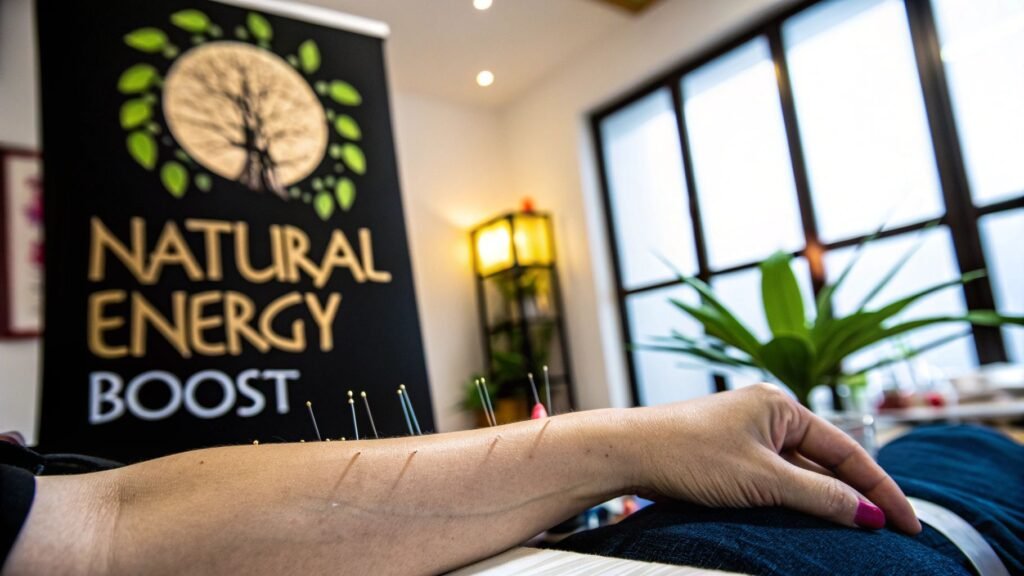For anyone caught in the relentless grip of exhaustion, the question is a pressing one: *Can acupuncture really help with chronic fatigue?For anyone caught in the relentless grip of exhaustion, the question is a pressing one: Can acupuncture really help with chronic fatigue? The answer, backed by a growing body of evidence, is a resounding yes. It turns out that using acupuncture for chronic fatigue is a powerful and effective strategy for helping people reclaim their energy and, by extension, their lives.
Understanding Chronic Fatigue Beyond Simple Tiredness
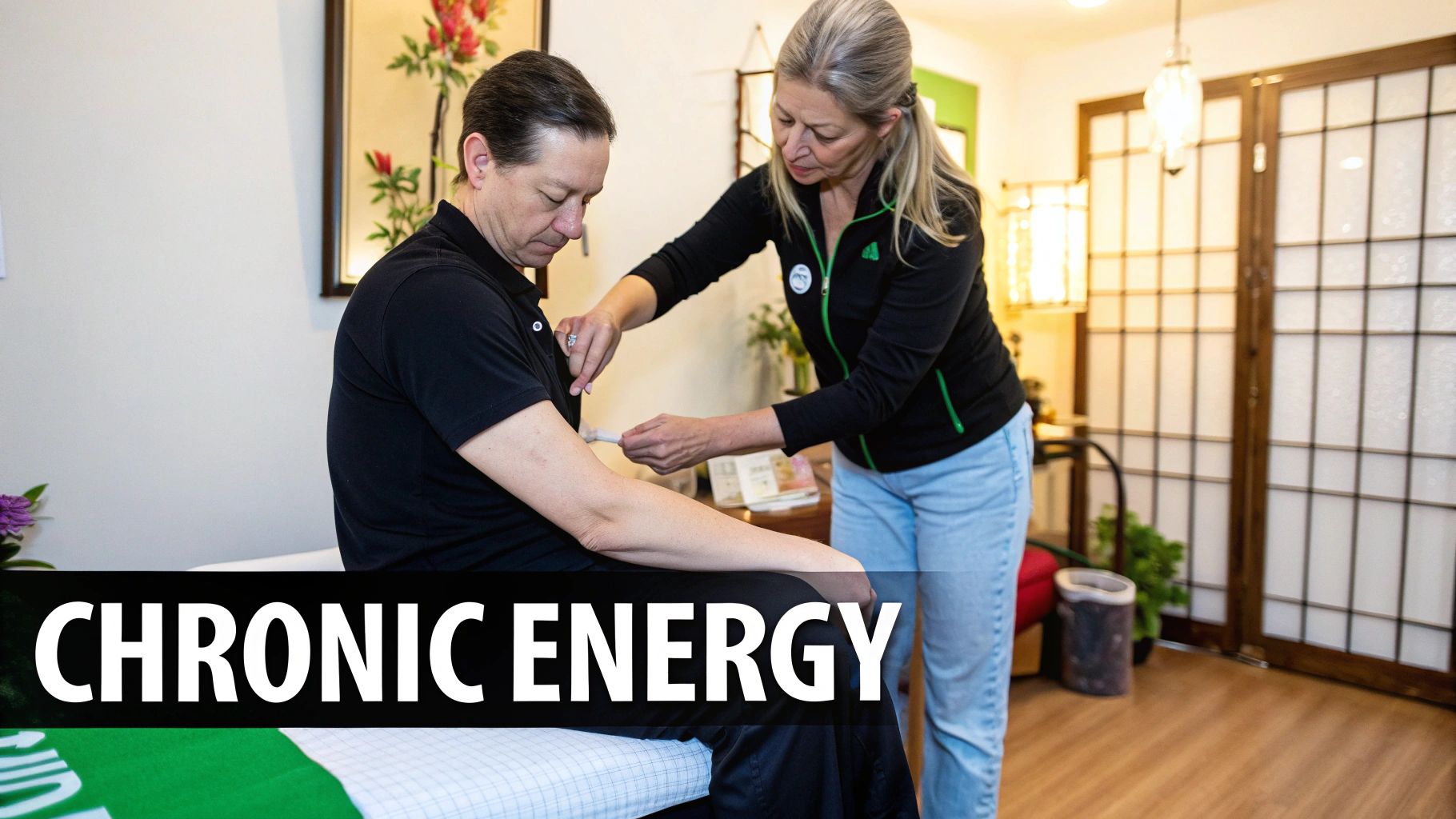
Chronic fatigue isn't just about feeling overtired after a long week. It's a deep, persistent exhaustion that no amount of sleep or rest can seem to fix. A good way to think about it is like having a smartphone with a faulty battery—no matter how long you leave it plugged in, the charge just won't climb past 10%. This constant state of energy debt can make every part of life feel like an uphill battle.
This condition, often diagnosed as chronic fatigue syndrome (CFS) or myalgic encephalomyelitis (ME/CFS), makes simple daily tasks feel monumental. It often brings along brain fog, muscle pain, and unrefreshing sleep, trapping you in a cycle that conventional methods alone struggle to break.
The Global Impact of Chronic Fatigue
This is far from a rare or isolated problem; it’s a major global health concern. Across the world, the prevalence of idiopathic chronic fatigue (ICF) and CFS is around 10% and 1%, respectively. These numbers underscore the urgent need for therapies that truly work. Thankfully, modern research is starting to validate ancient practices. One controlled trial found that just four weeks of acupuncture alongside standard care led to significant improvements in fatigue symptoms. You can dive into the full findings of this acupuncture study for a closer look.
The physical drain is also frequently compounded by a heavy mental and emotional toll. When your body is perpetually running on empty, it’s only natural to feel frustrated, isolated, and anxious. This is where a more holistic approach is so crucial.
Acupuncture offers a path forward by treating the whole person, not just a list of symptoms. It’s designed to correct the deep-seated imbalances that cause this profound exhaustion, helping you restore your vitality from the inside out.
For a quick overview of how acupuncture fits into a chronic fatigue treatment plan, here's a look at the key points.
Acupuncture for Chronic Fatigue At a Glance
| Aspect | Summary |
|---|---|
| Primary Goal | To restore the body's natural energy flow (Qi) and correct underlying imbalances causing fatigue. |
| Approach | Holistic; treats the entire person rather than isolated symptoms like tiredness or pain. |
| Mechanism | Stimulates the nervous system, reduces inflammation, improves circulation, and balances hormones. |
| Role in Treatment | Often used as a complementary therapy alongside conventional medical care to enhance results. |
| Patient Experience | Typically relaxing, with a focus on creating a personalized treatment plan for sustainable energy. |
| Evidence | Growing clinical evidence supports its effectiveness in reducing fatigue and improving quality of life. |
This table helps illustrate why so many are turning to acupuncture—it's not a quick fix, but a comprehensive approach to wellness.
Moving Beyond Conventional Limits
While conventional medicine provides essential tools for managing symptoms, many people find these approaches don’t deliver a complete solution. They might take the edge off certain issues but often fail to restore a person's overall sense of energy and well-being. This is precisely the gap that acupuncture can help bridge.
Instead of just putting a bandage on the tiredness, acupuncture works to fundamentally rebalance your body's internal systems. Think of it as a complementary therapy that can amplify the effectiveness of your current care plan. By viewing the body as an interconnected system, an acupuncturist identifies and works to clear the "energy blockages" that contribute to a state of perpetual fatigue. This perspective offers a new way to understand and treat this debilitating condition, moving you from a state of constant energy deficit toward a feeling of renewed wellness.
How Acupuncture Rebalances Your Body's Energy
To really wrap your head around how acupuncture helps with chronic fatigue, we have to start with the perspective of Traditional Chinese Medicine (TCM). This isn't a new-age concept; it's an ancient system that has viewed the body as a single, interconnected whole for thousands of years.
At the heart of TCM is the idea of Qi (pronounced "chee"). Think of Qi as your body's fundamental life force—the vital energy that animates you and powers every single function, from breathing to thinking.
Here’s a simple analogy: Imagine your body's Qi is the electrical current running through your house. When the flow is strong and steady, every light turns on, the appliances run smoothly, and the whole system works perfectly. You feel energetic, sharp, and simply alive.
But chronic fatigue, in this view, is like having faulty wiring or a bunch of blown fuses. The current is weak, blocked, or completely drained. It doesn't matter how often you try to "recharge" with rest; the underlying electrical problem means the lights just won't stay on.
The Pathways of Energy and Your Internal Organs
This vital Qi doesn't just slosh around randomly inside you. It travels along precise pathways called meridians. These meridians are like the electrical circuits in your home's walls, connecting different organ systems and ensuring every part of your body gets the energy it needs.
An acupuncturist, then, is a bit like a master electrician for your body. We're trained to find exactly where those energy blockages or deficiencies are hiding. By inserting incredibly thin needles into specific points along these meridians, we can essentially get into the circuit board and:
- Clear out blockages to get the Qi flowing smoothly again.
- Strengthen weak energy in areas where it's been depleted.
- Harmonize the communication between different organ systems that have fallen out of sync.
This process is about rebooting your entire internal energy grid. The goal isn't to give you a temporary jolt of energy, like another cup of coffee. It’s about repairing the underlying system so your body can generate and circulate its own vitality again, for good.
In TCM, chronic fatigue isn't just "feeling tired." It's a loud and clear signal that the body's core energy-producing functions are out of balance and crying out for support.
When we see chronic fatigue in the clinic, it's often linked to deficiencies in the organ systems responsible for creating and distributing Qi. The two main players are almost always the Spleen and the Kidneys.
The Role of the Spleen and Kidneys in Energy Production
Now, it's crucial to understand that when an acupuncturist talks about the "Spleen" or "Kidneys," we're not just talking about the physical organs you'd see in an anatomy book. We're referring to broader functional systems.
-
The Spleen System: In TCM, the Spleen system is your "energy factory." It's in charge of taking the food you eat and transforming it into usable Qi and blood. If your Spleen system is weak, the factory just isn't efficient. This often shows up as that heavy, weary kind of fatigue, along with bloating or poor digestion.
-
The Kidney System: The Kidneys, on the other hand, are like your body's deep-cycle battery. They store your foundational energy reserve—your core vitality. This reserve naturally gets drained by chronic illness, prolonged stress, and simply aging. A deficiency here leads to that deep-seated, bone-weary exhaustion, often accompanied by things like low back pain or a general lack of drive.
A skilled acupuncturist will diagnose which of these systems is at the root of the problem to create a truly personal treatment plan. By targeting whether it's a weak Spleen, depleted Kidneys, or a combination, acupuncture helps rebuild your body's innate ability to create and sustain energy for the long haul. This is also why so many people find success with acupuncture for stress management, as chronic stress is one of the biggest drains on our precious Kidney energy.
The Science Behind How Acupuncture Fights Fatigue
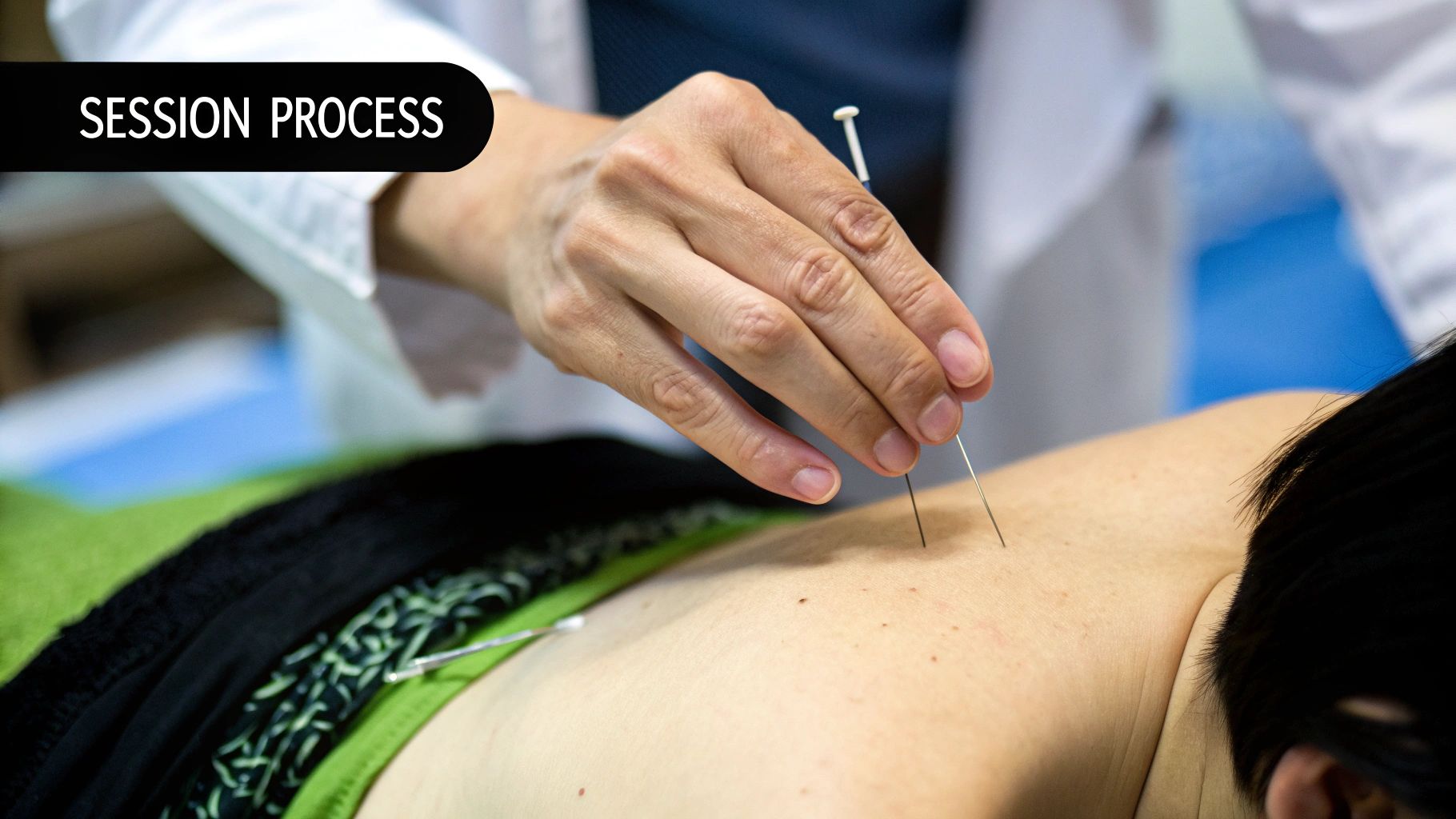
While the ancient principles of Qi offer a rich framework, modern science gives us another powerful way to understand how acupuncture gets to the root of fatigue. You can think of it like a skilled conductor leading a complex orchestra; the acupuncturist isn't playing an instrument, but rather guiding the body's entire system back toward harmony.
When an acupuncturist places fine needles at specific points, they are actually stimulating the peripheral nervous system. This sends a direct signal to your brain and spinal cord, triggering the release of key neurochemicals and hormones—the very things that regulate your energy levels, mood, and pain perception.
Modulating Your Body’s Stress and Inflammatory Response
One of acupuncture’s most profound effects is its ability to calm the body’s stress response. Chronic fatigue is often linked to a haywire hypothalamic-pituitary-adrenal (HPA) axis, which is essentially the command center for stress hormones like cortisol. Acupuncture helps bring this system back into balance, pulling you out of that constant "fight or flight" mode that drains your energy.
The treatment also has a measurable impact on inflammation, a well-known driver of fatigue. The strategic placement of needles can trigger a potent anti-inflammatory response, quieting the overactive immune processes that leave you feeling sick and exhausted. We see a similar mechanism at play in other conditions, as we cover in our guide on acupuncture for chronic pain.
Acupuncture acts as a powerful biomodulator. It doesn’t just put a band-aid on fatigue; it helps retrain your nervous, endocrine, and immune systems to work more efficiently, leading to a real, sustainable increase in natural energy.
Scientific support for acupuncture for chronic fatigue is solidifying its place as an evidence-based therapy. A landmark 2018 study from the Beijing Chaoyang Fatou Community Health Service Center, for instance, confirmed its effectiveness for treating chronic fatigue syndrome (CFS). Researchers found that while sham (or "fake") acupuncture had no real effect, both standard acupuncture and a technique called warm needling produced significant clinical improvements for patients. You can read a summary of the chronic fatigue study findings here.
The Biochemical Impact on Energy and Well-being
So, what’s happening on a biochemical level? The benefits you feel are directly tied to measurable changes inside your body. Placing needles prompts the release of several key substances that actively fight fatigue and promote a sense of wellness.
Here are a few of the key mechanisms at work:
- Boosting Endorphins: Acupuncture stimulates the release of endorphins, your body's natural "feel-good" chemicals that also relieve pain. This creates a sense of well-being and can directly counteract the physical aches and discomfort that so often come with chronic fatigue.
- Improving Blood Circulation: The treatment enhances blood flow throughout the body. Better circulation means more oxygen and nutrients get delivered to tired muscles and organs, improving their function and helping clear out the metabolic waste products that cause sluggishness.
- Enhancing Nerve Signaling: For those with fatigue-related pain, numbness, or "brain fog," acupuncture helps improve nerve signaling. This restores clearer communication between your brain and body, which can reduce pain and sharpen mental function.
This chart from a prominent study perfectly illustrates the difference. It highlights a significant reduction in fatigue scores for patients receiving acupuncture compared to those getting usual care.

The data speaks for itself. Patients who received acupuncture reported a much more dramatic improvement in their fatigue levels as the treatment progressed. This kind of hard evidence bridges the gap between ancient theory and modern science, confirming that acupuncture is a legitimate and powerful tool for recovering your energy.
Tailored Acupuncture Techniques for Energy Restoration
When it comes to treating chronic fatigue, acupuncture is far from a one-size-fits-all solution. Think of an experienced practitioner not just as a clinician, but as a master craftsperson with a diverse toolkit. They carefully assess your unique pattern of energy depletion to select the precise methods needed to restore your body’s natural balance.
The foundation is almost always traditional body acupuncture, but the real art lies in layering in other powerful techniques. This ensures the treatment goes beyond just managing symptoms and instead targets the very root of your exhaustion, paving a clearer path toward lasting energy.
The Warming Power of Moxibustion
For anyone battling a deep, persistent fatigue that feels heavy and cold, moxibustion is an incredibly effective complementary therapy. It involves burning a specially prepared dried herb called mugwort (Artemisia vulgaris) near specific acupuncture points. The result is a gentle, penetrating heat that warms and invigorates the points and their associated energy pathways, known as meridians.
Imagine the deeply soothing relief of a therapeutic heated blanket on sore, achy muscles. Moxibustion works similarly, but on a deeper energetic level. The warmth dispels the internal "cold" and "dampness" that so often manifest as sluggishness and that bone-deep feeling of heaviness. It's a nourishing, energizing boost that works hand-in-glove with the acupuncture needles, especially for those whose fatigue stems from a "cold" or "deficient" constitution.
This isn't just theory; modern research has validated what practitioners have known for centuries. A major 2022 systematic review found that combining acupuncture with moxibustion was significantly more effective at treating chronic fatigue syndrome than many other common therapies. For a closer look at the data, you can read the complete research on acupuncture and moxibustion effectiveness.
Other Specialized Acupuncture Methods
To fine-tune your treatment plan, your practitioner may also integrate other specialized approaches. These methods can help break through stubborn patterns and accelerate your recovery.
A skilled acupuncturist will often combine several different techniques to create a multi-faceted treatment plan. To help you understand the options, here is a quick comparison of therapies you might encounter.
Comparing Acupuncture Therapies for Chronic Fatigue
| Technique | Description | Best For |
|---|---|---|
| Traditional Acupuncture | Insertion of fine, sterile needles into specific points along the body's meridians to rebalance Qi (energy) flow. | Broad-spectrum treatment for most types of chronic fatigue, addressing underlying organ system imbalances. |
| Moxibustion | The application of gentle heat from burning mugwort near acupuncture points to warm and invigorate the flow of Qi and blood. | Patients who feel cold, heavy, or have fatigue that worsens in cold or damp weather. Excellent for "deficient" conditions. |
| Electroacupuncture | A mild electrical current is passed between pairs of acupuncture needles, providing continuous stimulation to the points. | Stubborn or severe fatigue, particularly when accompanied by pain or muscle tension. Helps amplify the treatment's effects. |
| Auricular (Ear) Acupuncture | Placement of tiny needles or non-invasive "seeds" on specific points of the ear, which corresponds to the entire body. | Reinforcing the effects of a full-body treatment between sessions. It's also great for addressing stress and cravings that can worsen fatigue. |
By layering these approaches, your practitioner can customize a truly comprehensive therapy. This ensures every aspect of your energy imbalance—from weak organ function to blocked energy pathways—is addressed, leading to more effective and sustainable results.
This image highlights how different approaches can yield varying outcomes, reinforcing the importance of a personalized plan.
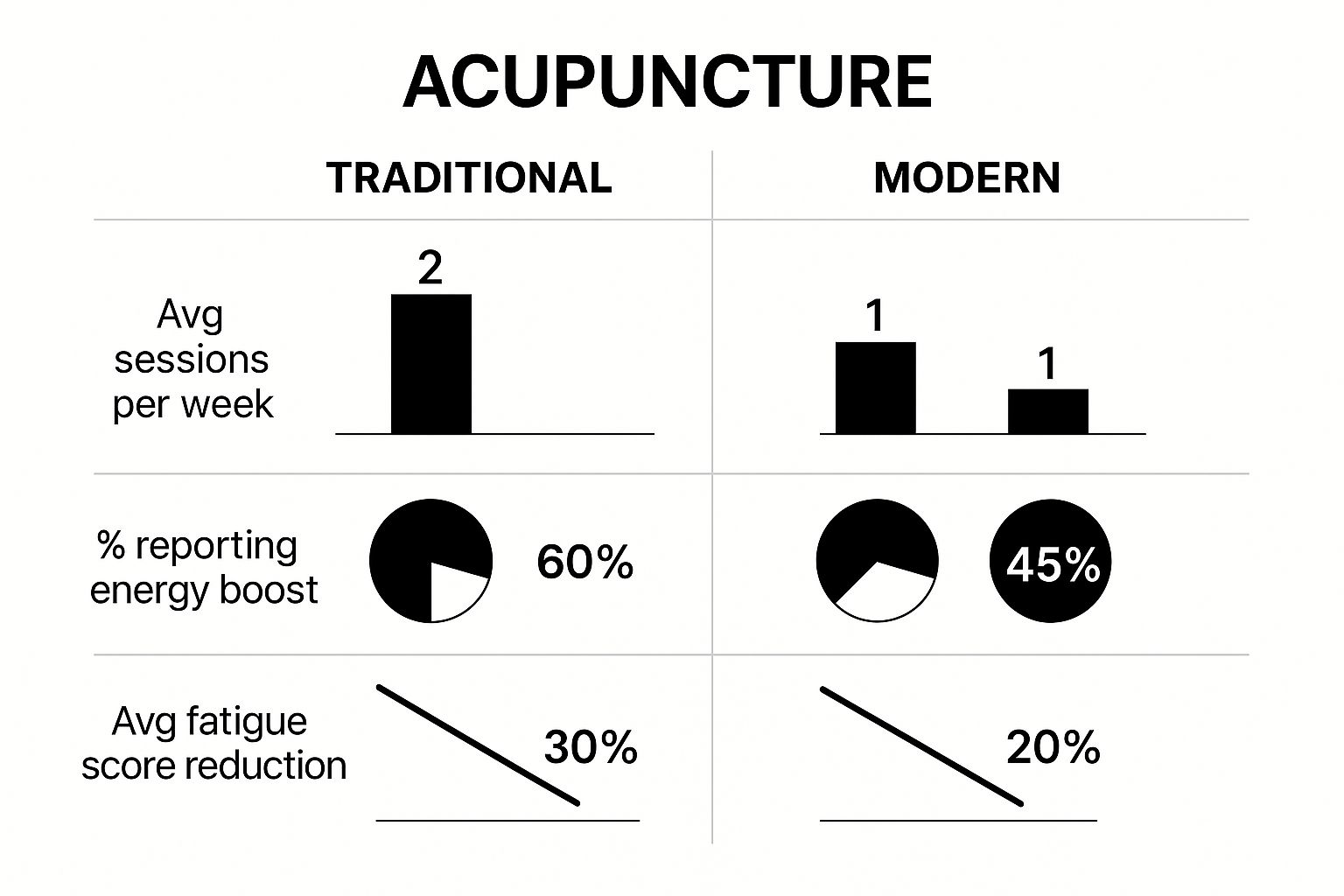
As the data shows, while all acupuncture methods are beneficial, a plan rooted in traditional techniques often produces a higher rate of overall energy improvement. This underscores the value of a practitioner who can draw on time-tested wisdom while integrating modern advancements where they’ll be most effective.
What to Expect From Your First Acupuncture Session
https://www.youtube.com/embed/rfLKwFO5gUY
If you're dealing with chronic fatigue, walking into an acupuncturist’s office for the first time can feel like a mix of hope and uncertainty. I get it. But let me put your mind at ease—that first visit is a comfortable, structured, and surprisingly insightful process. It's less about a quick fix and more about starting a deep investigation into your specific health story.
The session kicks off with a conversation, not needles. Your practitioner’s main job, initially, is to be a detective, gathering clues about what’s really driving your exhaustion. We’ll talk about your fatigue, of course, but we'll also dive into your sleep patterns, digestion, stress levels, and emotional well-being. This isn’t just small talk; it's the foundation for a treatment plan built specifically for you.
The Diagnostic Process
After we've talked, your practitioner will use a couple of traditional diagnostic methods that give us a unique look at your internal health—the kind of information a standard physical might miss.
-
Pulse Diagnosis: This is much more than just checking your heart rate. By feeling the pulse on both of your wrists, a skilled practitioner can assess the quality, strength, and character of the energy flow in multiple positions. Each position corresponds to a different organ system, giving us direct clues about where your body's energy, or Qi, is depleted or blocked.
-
Tongue Diagnosis: Yes, we'll ask you to stick out your tongue! Its shape, color, and coating act like a map of your internal environment. It can tell us a lot about your circulation, fluid balance, and digestive health—all critical pieces of the chronic fatigue puzzle.
This hands-on diagnostic work is what makes acupuncture for chronic fatigue so effective. It ensures your treatment isn't a one-size-fits-all approach but is instead targeted to what your body truly needs to rebalance.
Your first visit is designed to be a deeply personal and insightful experience. It’s about uncovering the ‘why’ behind your fatigue so your practitioner can develop a targeted strategy to help you heal.
The Acupuncture Treatment Itself
Once your practitioner has a clear picture of your unique pattern, the actual treatment begins. You'll get comfortable on a treatment table, and then the acupuncturist will insert very fine, sterile, single-use needles into specific points on your body.
I know the idea of needles can make people nervous, but they are incredibly thin—many are as fine as a strand of hair. Most people feel very little, maybe a tiny prick as the needle goes in. What you might feel next is a subtle tingling, heaviness, or warmth around the point. We actually see this as a good sign; it means the Qi is responding.
With the needles in place, all you have to do is relax for about 20 to 30 minutes. It’s quiet time for your body to do its work. Many of my patients find this part of the session incredibly calming and often drift off into a light nap. This rest period is crucial for letting the treatment guide your body's energy back toward balance.
Afterward, the needles are gently removed, and your session is done. This entire process is often one part of a larger wellness strategy. You can see how it's applied to other conditions by reading about alternative medicine for pain.
Finding the Right Acupuncturist for Your Needs
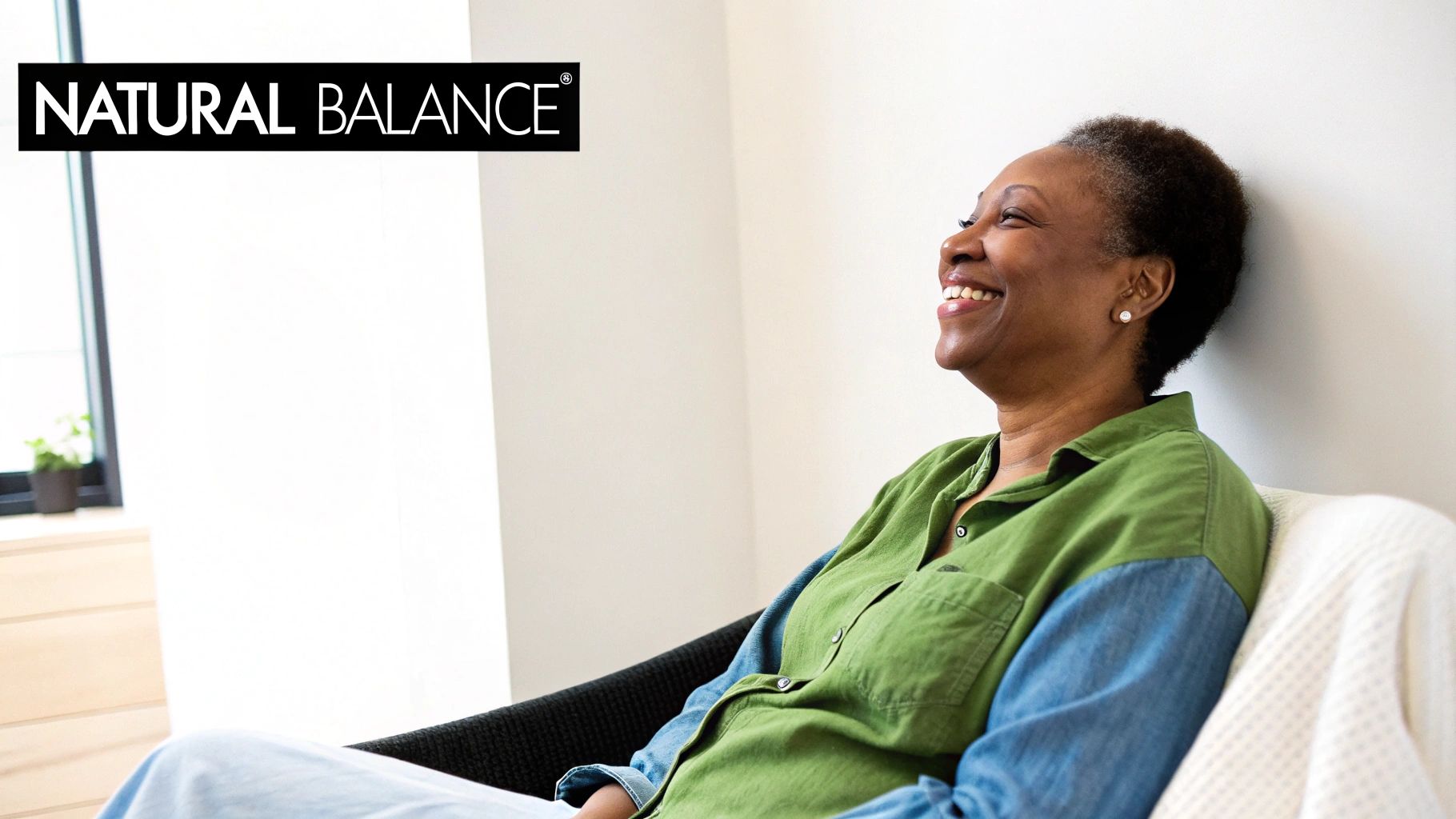
When you decide to try acupuncture for chronic fatigue, finding the right practitioner is everything. This single choice can make all the difference in your experience and results. Think of it like hiring a guide for a challenging expedition; you wouldn't just pick anyone. You'd want an expert who knows the terrain like the back of their hand.
The same holds true for acupuncture. While many practitioners are skilled, you'll get the most out of your treatment by working with someone who has specific, hands-on experience with chronic fatigue. They'll understand the deep-seated energy depletion you're feeling and know how to tailor a treatment plan that gets to the root of the problem.
Verifying Essential Credentials
Before you even book a consultation, it’s smart to do a quick credentials check. This isn't about being difficult—it's about ensuring your safety and setting yourself up for success. A few key qualifications act as a reliable filter for quality care.
There are two primary credentials you should always look for:
- State Licensure (L.Ac.): This is the absolute baseline. An L.Ac. (Licensed Acupuncturist) has met your state's specific legal and educational standards to practice. It’s a non-negotiable mark of a true professional.
- NCCAOM Certification: This is the gold standard in our field. The National Certification Commission for Acupuncture and Oriental Medicine provides a rigorous board certification that signals a practitioner's deep expertise and commitment to the highest standards of care.
Finding a practitioner who holds both a state license and NCCAOM certification gives you peace of mind. You know you're placing your health in the hands of a dedicated and highly competent professional.
Practical Steps for Finding Your Practitioner
So, where do you begin the search? Professional directories are an excellent starting point. The NCCAOM, for instance, has an incredibly useful online directory that lets you find certified practitioners near you.
Using a trusted directory like this takes the guesswork out of the process, as you know everyone listed has already cleared a high bar for professional standards.
Word-of-mouth is also invaluable. Don't hesitate to ask your primary care physician or other trusted healthcare providers if they have any recommendations. Sometimes the best referral comes from a friend or family member who has had a great experience themselves.
Discussing Cost and Insurance Coverage
Finally, let's talk about the practical details: cost and insurance. Before you begin treatment, you'll want a clear picture of the financial side of things. It's a completely normal and important conversation to have.
The good news is that many clinics are transparent about their pricing, and more insurance plans are covering acupuncture every year. Here at our clinic, for instance, we work with major providers like Blue Shield, Cigna, Kaiser, and UnitedHealthcare. We even offer a complimentary benefits check to help you understand your coverage upfront.
My best advice? Always call your insurance provider directly. Confirming the specifics of your plan ahead of time empowers you to move forward without financial stress, so you can focus on what's most important—getting your energy and your life back.
Your Questions About Acupuncture and Chronic Fatigue, Answered
If you're thinking about trying acupuncture for chronic fatigue, it's completely normal to have questions. Getting a handle on the practical side of things can make you feel much more comfortable and ready to start. Here are some straightforward answers to the questions we hear most often from patients just like you.
Does Getting Acupuncture for Chronic Fatigue Hurt?
For most people, the answer is a resounding no. The needles we use are incredibly fine and flexible—some are as thin as a single strand of human hair. You might feel a tiny pinch when the needle first goes in, but that feeling usually disappears in an instant.
What comes next is often described as a dull ache, a gentle warmth, or a bit of a tingle around the needle. We call this sensation Deqi, and it’s a great sign! It means your body's energy is being activated and responding to the treatment. Honestly, far from being painful, most people find the whole experience so relaxing they doze off during the session.
An acupuncture session is designed to be gentle and therapeutic. Our primary goal is to encourage your body to relax and heal, never to cause discomfort.
How Soon Will I See Results?
When you're dealing with a complex condition like chronic fatigue, patience is your best friend. Some people notice subtle improvements in their energy or sleep patterns after just one or two appointments. However, for significant, lasting change, a consistent series of treatments is usually necessary.
I like to compare it to tending a garden. You plant the seeds, water them, and give them sunlight, but you don't expect a full harvest the next day. For most of our patients, truly noticeable shifts in energy levels and a decrease in fatigue become clear after several weeks of regular sessions.
Are There Any Side Effects?
When performed by a licensed and experienced professional, acupuncture is exceptionally safe. The side effects that do occur are almost always minor and don't last long. They might include:
- A little bit of bruising where a needle was placed
- A single drop of blood when a needle is removed
- Minor soreness that fades very quickly
Serious complications are extremely rare, so you can rest assured that you're in good hands.
Can I Use Acupuncture With Other Medical Treatments?
Absolutely, and we encourage it. Acupuncture shines as a complementary therapy that works alongside conventional medical treatments for chronic fatigue.
The key is communication. It's vital to keep all your healthcare providers in the loop. By making sure your primary doctor and your acupuncturist are aware of all the treatments you're receiving, you create an integrated, safe, and much more effective plan for getting your health back on track.
Ready to see how a personalized approach can help restore your energy? The team at Eric Tsai Acupuncture and Herbs blends traditional wisdom with modern insights to build a treatment plan specifically for you. Find out more about how we can help on our official website.

